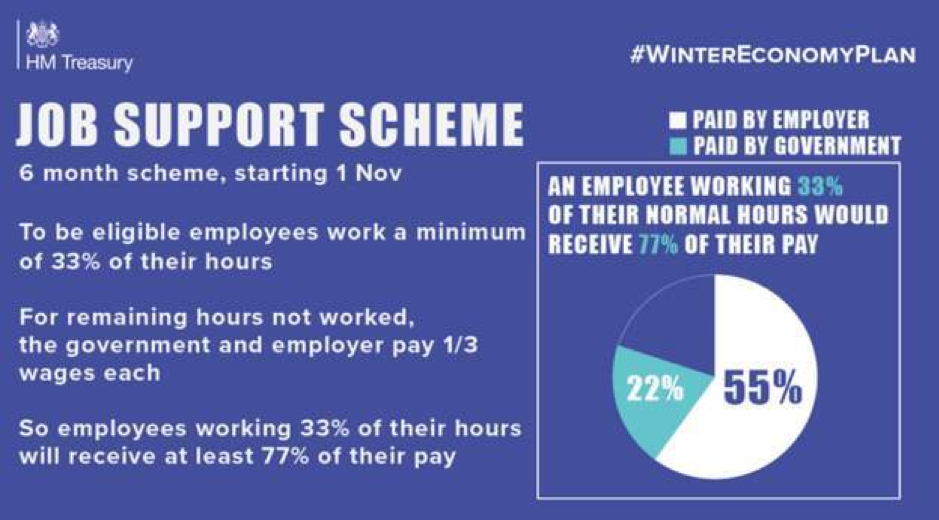Key Points From The Government’s Winter Economy Plan
Job Support Scheme:
- Replaces the Job Retention Scheme and will run for 6 months: 1 Nov 20 – 30 Apr 21
- Eligibility: All employers (small and medium companies) with a UK bank account and UK PAYE schemes can claim the grant. Neither the employer nor the employee needs to have previously used the Coronavirus Job Retention Scheme
- Employees must have been on an employer’s PAYE payroll on or before 23 September 2020. This means a Real Time Information (RTI) submission notifying payment to that employee to HMRC must have been made on or before 23 September 2020.
- The employee must be brought back to work for a minimum of 1/3 of their usual hours.
- With respect to the employee’s unworked hours, the cost of these hours will be equally split 3-ways between the government, the employer and the employee. Therefore, for an employee unaffected by the Government cap and who works 1/3 of their usual hours, they will receive 7/9 (77%) of their usual pay at a cost to the employer of 5/9 of their usual pay.
- The government’s contribution will be capped at £697.92 per month
- Employers using the Job Support Scheme will also be able to claim the Job Retention Bonus if they meet the eligibility criteria.

Self-Employment Income Support Scheme Grant Extension:
- The scheme will last for 6 months, from November 2020 to April 2021 and will be in the form of two taxable grants
- The first grant will cover the period Nov 20 – Jan 21 à 20% of average monthly trading profits, paid out in a single instalment covering 3 months’ worth of profits, and capped at £1,875 in total.
- The second grant will cover the period Feb 21 – Apr 21 à The government will review the level of the second grant and set this in due course.
VAT Deferral new payment scheme:
- Businesses who deferred VAT due from 20 March to 30 June 2020 will now have the option to pay in smaller payments over a longer period.
- Instead of paying the full amount by the end of March 2021, you can make smaller payments up to the end of March 2022, interest free.
- You will need to opt-in to the scheme, and for those who do, this means that your VAT liabilities due between 20 March and 30 June 2020 do not need to be paid in full until the end of March 2022.
New Self-Assessment Self-Serve Time To Pay Scheme:
In January 21 the balancing liability for your 2019/20 tax liability along with the first payment on account for 2020/21 become due for payment. If you previously choose to defer your second payment on account for 2019/20 then you may find the amount due this January larger than usual. To help the Government are introducing a self-serve time to pay scheme.
- If you’re unable to pay your Self-Assessment (SA) bill in full by 31 January 2021, you can set up a Time to Pay payment plan of up to 12 months online without speaking to HMRC. If you have SA tax debts of up to £30,000, you’ll able to access this Time to Pay facility through GOV.UK and will get automatic and immediate approval.
- If your SA debts are over £30,000, or you need longer than 12 months to repay your debt in full, you will still be able to use our Time to Pay arrangement by calling HMRC.
Other important announcements:
- Applications for the Coronavirus Business Interruption Loan Scheme (CBILS) and the Bounce Back Loan Scheme (BBLS) have been extended to 30 November 20
- Pay as you Grow – The government will give all businesses that borrowed under the BBLS and CBILS the option to repay their loan over a period of up to ten years.
- The VAT cut for hospitality and leisure sectors from 20% to 5% has been extended to 31 March 2021
If you need highly experienced and qualified London accountants offering a fast, reliable, friendly service – look no further than the team at Howlader & Co. Our experienced team – with some of the finest chartered accountants London has to offer – can help you.



